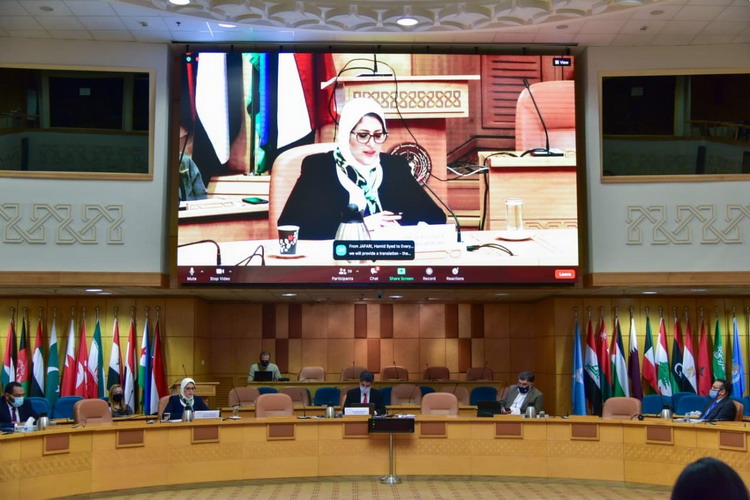 Egypt’s Minister of Health and Population H.E Dr Hala Zayed, who was elected as co-chair, making her interventions during the inaugural meeting
Egypt’s Minister of Health and Population H.E Dr Hala Zayed, who was elected as co-chair, making her interventions during the inaugural meeting
Cairo, 16 March 2021 – The inaugural meeting of the Regional Subcommittee on Polio Eradication and Outbreaks was convened today by WHO’s Regional Director for the Eastern Mediterranean Dr Ahmed Al-Mandhari.
The new Regional Subcommittee aims to bring together Member States from across the Region to focus on renewing regional solidarity and commitment which is needed to achieve polio eradication. Agreement on establishing a Subcommittee was formally endorsed by Member States through a resolution at the Sixty-seventh session of the Regional Committee for the Eastern Mediterranean in October 2020.
“By bringing together Ministers of Health from governments across the Region, we aim to raise the visibility of the polio emergency, galvanize political and financial support, and ensure collective public health action as a Region and blocs, rather than on a country-by-country basis. This subcommittee is a true implementation of the regional vision 2023; health for all by all: a call for solidarity and action” said Dr Al-Mandhari.
The spread of polio in the Eastern Mediterranean Region has become a pressing emergency and it remains a Public Health Emergency of International Concern (PHEIC) under the International Health Regulations (IHR 2005). Wild poliovirus transmission has spread beyond core reservoirs of the endemic countries – Afghanistan and Pakistan – and outbreaks of circulating vaccine-derived polioviruses type-1 (cVDPV1) and type-2 (cVDPV2) have emerged, with the latter expanding significantly in the Region.
Today’s meeting comes one year after polio workers and infrastructure began transitioning assets from polio eradication efforts to address COVID-19 and ably demonstrated the programme’s foundational value to public health systems in nearly every regional Member State. More broadly, the programme was able to demonstrate its utility in responding to the COVID-19 pandemic.
During the inaugural meeting, the subcommittee endorsed the nomination of co-chairs Minister of Health and Population, Egypt, H.E Dr Hala Zayed and the Minister of Health and Prevention, United Arab Emirates, H.E. Abdul Rahman Mohammed Al Oweis.
“We should take the significant spread of poliovirus in the Region as an alarm bell. But this is also an opportunity, to support and intensify our coordinated efforts for polio eradication but also our collective effort to ensure access to children for all needed vaccinations,” Dr Hala Zayed, Minister of Health and Population, Egypt, said during her address to the Subcommittee.
“Through His Highness Sheikh Mohammed bin Zayed Al Nahyan's initiative to eradicate polio, we will continue to support Pakistan and Afghanistan to battle polio. In cooperation with the ministries of health, we commit to cooperating with all Member States,” said Dr Hussain Al Rand, the Assistant Undersecretary for Health Centres and Clinics and Public Health, United Arab Emirates on behalf of H.E. Abdul Rahman Mohammed Al Oweis.
Member States agreed on four strategic areas of focus to engage in coordinated action and support of regional polio eradication efforts. There was widespread consensus among ministers present that the initiative was an important forum to raise the visibility of the polio emergency in the Region, while pushing for collective public health action, strengthening efforts to transition polio assets and infrastructure and advocating for the mobilization of national and international funding to sustain polio eradication efforts.
“We are still reeling from the March-July pandemic-necessitated campaign suspension and its impact on the polio programme. Nearly 80 million vaccination opportunities were lost. But we are moving forward. Through this new Regional Subcommittee, we aim to make up lost ground and leverage the strong credibility that the polio programme has built through its vigorous support to COVID-19 response and back again to polio,” said Dr Hamid Jafari, Director of the regional polio programme and co-facilitator of the Regional Subcommittee.
In adherence with COVID-19 best practices, the inaugural meeting of the Regional Subcommittee was held virtually. The subcommittee agreed to convene quarterly, supported by the secretariat from the WHO Regional Office.
Note to editors
Polio case count for 2020 in the Eastern Mediterranean Region:
- 140 wild poliovirus cases: 56 in Afghanistan, 84 in Pakistan
- 29 cVDPV1 cases, all from Yemen
- 515 cVDPV2 cases: 308 in Afghanistan, 135 in Pakistan, 58 in Sudan, 14 in Somalia
- cVDPV2 strains detected sewage systems in Egypt, establishing local transmission
- cVDPV2 strains detected sewage in Islamic Republic of Iran, without evidence of local circulation
For more information, please contact:
Emma Sykes
Communication Officer, Polio
+962 7 9021 6115








